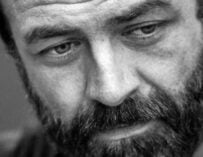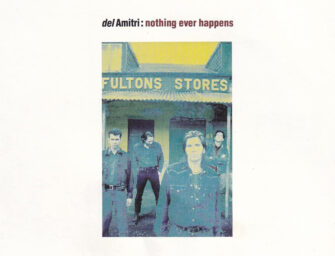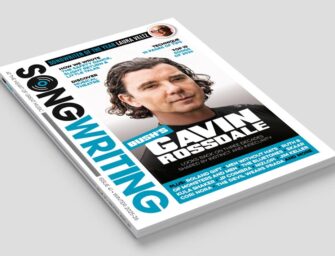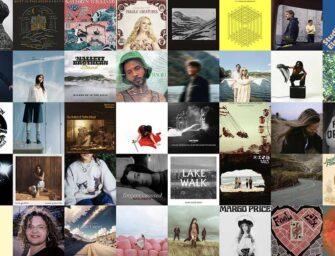
Ed Wallis from Green Rays: “I’ve got lots of song ideas stashed away that, from time to time, I dip back into.”
We hear from the former My Sad Captains singer returning with a new project and a deeply personal debut album
For this record, I’d become committed to the idea of making a fresh start. My previous band, My Sad Captains, had made four records, all of which I’m really proud of. But there had been a gradual process of line-up changes, and when another drummer announced he was hanging up his sticks, I decided it was time for something new.
This was all fuelled by big changes in my life too. I started writing the record around when our first son was born. And I’d just finished tracking it when we lost our second son.
So there is a lot tied up for me in this record. And having been writing, recording and releasing music for a while now, I’ve been reflecting on what my process is like these days, whether it’s changed, and how this new set of songs for a new project – Green Rays – came to be.
Here are five things I’ve learned:
1. THE RIGHT LYRIC CAN UNLOCK A SONG
I’m very much “music first” when it comes to writing. The melody will often come with a few key phrases or suggest some sounds, which then gives me a bit of a map to develop ideas from there. But getting the lyrics right is normally the difference between a song not really going anywhere or ending up finished.
One song off the record is a good example, called Only One Way To Go. I’d had it knocking about for a while and it was a slightly different type of song for me, based around drum machine, a synth loop and a New Order-y bassline. I had most of the lyric but the main payoff line was nonsense and it meant I just couldn’t get the song over the line.
So I forgot about it, until one day for no particular reason I happened to sing, “Only one way to go,” in my head and it made the whole song fall into place. Turns out all it needed was that one line to tie everything together.

Ed Wallis from Green Rays: “Getting the lyrics right is normally the difference between a song not really going anywhere or ending up finished.”
2. USE MIXED METHODS
I’ve often heard songwriters a few albums into their careers talk about switching from writing on guitar to writing on piano because they are less familiar with it. After a while of playing the guitar you know what’s going to happen if you put your fingers in a certain place. So it’s good to have a few different approaches to developing ideas.
I’ve got two main methods of writing. The first is the classic singer-songwriter mode, playing acoustic guitar. I’ve got more into open tunings in recent years, doing more finger-picking and find I definitely end up in less predictable places. Each of the last few albums I’ve made has one or two open tuning songs, like Everything At The End Of Everything on the last My Sad Captains record, or Beginner’s Mind on this new Green Rays one.
The second is more computer-based, layering up sounds on Logic. This way of working ends up being more experimental and less structured, with melodies emerging out of loops and intertwining guitar or synth lines. So the first song on the record – Getting Back Again – came from fiddling around with an arpeggiator and playing a synth melody over the top. And the final track – Hard To Find – developed out of experimenting with delay settings on a new pedal, the Earthquaker Avalanche Run.
3. EMBED YOUR PROCESS IN YOUR EVERYDAY LIFE
I used to think of the songwriting process as somewhat sacred and something you had to be totally focused on when doing it. Now I’ve got two young kids it’s not really an option. But I’ve embraced being creative and writing songs while doing everyday stuff.
So one of my main writing times for this record was fairly early in the morning, with my son in the baby bouncer. I found that I could keep the bouncer going with my foot and I could play and sing. Two songs, in particular, I can think of being written in this way, In Between and a song called Another Life from the EP we released last year. They are both quite open-hearted strummers, which is a vibe that works well while baby bouncing.

Ed Wallis from Green Rays: “I’ll definitely trawl through the things I’ve been collecting over time to see what might potentially be languishing and forgotten about.”
4. DOCUMENT AND REVIEW
I’ve got lots of song ideas stashed away that, from time to time, I dip back into. One of the key songs on the record – Run – and the debut song I released as Green Rays came this way, found on an old hard drive. I’d no recollection of ever writing the song, but there it was, in a totally different key and sung in a bad falsetto, but essentially full formed and ready to go. I got it in a key I could actually sing and finished the words, and that was that.
It’s a really important song for me and one of my favourites I’ve done, but could have just been sitting there forever if I hadn’t happened to go back to it. So for the next record, I’ll definitely trawl through the things I’ve been collecting over time to see what might potentially be languishing and forgotten about.

Ed Wallis from Green Rays: “I’d always found middle eights to be my favourite bits of songs and seen them as core to the songwriting craft.”
5. DON’T FORGET ABOUT MIDDLE EIGHTS
My first album with My Sad Captains was full of middle eights. It was the late noughties, we’d released singles on indie pop labels. I’d always found middle eights to be my favourite bits of songs and seen them as core to the songwriting craft. The Beatles are obviously the masters. I always think Beck is really good at them. Saturday by Sparklehorse has one of my favourites.
But as the band developed, the songs got more stretched out, more krautrock influenced, and the middle eights disappeared. For this record, I remembered how much I like them. So they are back for me, and there are a couple of songs which are still quite long and exploratory, but rooted in songwriting where the middle eights are key. And the songs I’m writing at the moment for the next record are full of them.
































Related Articles